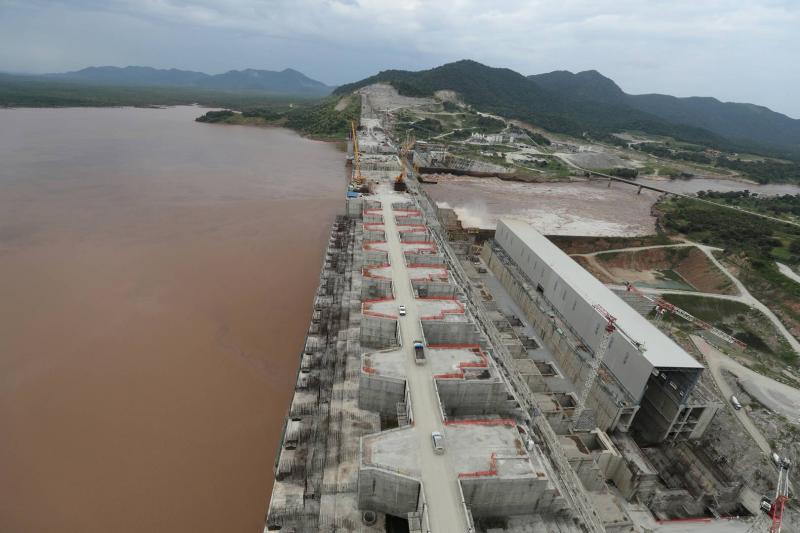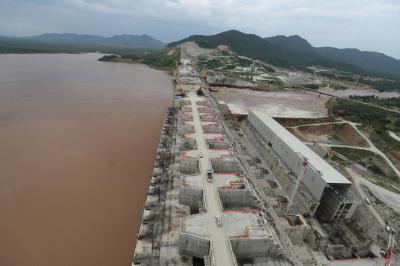The Egyptian statement announcing the end of the "negotiation path" regarding the Grand Ethiopian Renaissance Dam and affirming Egypt's commitment to defend its water security and national sovereignty in case of damage has raised questions about the anticipated scenarios concerning the crisis. This came after an Ethiopian statement accusing Cairo of "distortion."
The Egyptian Ministry of Water Resources and Irrigation announced the conclusion of the fourth and final meeting of the negotiations regarding the dam between Egypt, Sudan, and Ethiopia in Addis Ababa. This meeting was initiated under an agreement among the three countries to accelerate the preparation of an agreement on the rules for filling and operating the dam within four months. The statement mentioned the "intransigence of the Ethiopian side against the demands of the downstream countries, Egypt and Sudan," where Cairo confirmed that it would closely monitor the filling and operation of the dam while retaining its right, as stipulated under international covenants, to defend its water security and sovereignty in case of harm.
On its side, the Ethiopian Foreign Ministry stated that Cairo "distorted" Addis Ababa's positions in the talks, adding that Egypt still possesses a "colonial mentality" and has placed barriers against rapprochement efforts. The Ethiopian Foreign Ministry's statement reiterated Ethiopia's commitment to reaching a friendly settlement through negotiations that meet the interests of the three countries and its expectation to resume negotiations.
Egypt has long opposed the dam project due to concerns related to its future water supplies from the Nile River, upon which it heavily relies. Sudan has also expressed concern regarding the organization and safety of its water supplies and dams. Ethiopia, which claims to exercise its right to economic development, announced in September that it had completed the final phase of filling the reservoir for a massive hydropower station at the dam built on the Blue Nile.
Former Egyptian Minister of Water Resources Mohamed Nasr Allam believes that "Ethiopia wants to exploit the existence of the dam to redistribute Nile water shares as it planned in the Entebbe Agreement, which was rejected by Egypt and Sudan." He highlights that "Egypt cannot afford to lose a single drop of water, as the per capita share in Egypt is 500 cubic meters of water annually (50% of the minimum water poverty line), and it suffers from a food gap of about $10 billion annually."
He notes that Egypt has established drinking water desalination units with a capacity of over half a billion cubic meters annually, and Cairo processes wastewater and agricultural water for irrigation to overcome "water scarcity." The former minister mentioned that Ethiopia is violating international laws regarding the construction of this dam, stating that "when any country builds a project on a shared international river, it must undertake several steps." These steps include "prior notification to neighboring countries about the project and its objectives, conducting environmental studies on the impact of the project on neighboring countries to ensure no tangible harm, and obtaining the neighbors' approval after any significant modifications," according to the former Egyptian minister.
"This is what Addis Ababa did not do; it designed the dam without consulting Cairo and Khartoum, although at the outset of negotiations between Ethiopia, Egypt, and Sudan, a principles declaration was reached to agree that the three countries must come to an agreement on the rules for filling and operating that would not cause harm to the downstream countries," he adds.
On the other hand, Ethiopian parliament member Mohamed Al-Arousi considers the Egyptian statement premature and reflective of "unjustified despair." He argues that Egypt is "seeking international intervention in an indirect manner," which Ethiopia does not accept, and that Cairo is "insisting on agreements from the colonial era and trying to impose them on the negotiating committees."
Both Egypt and Sudan regard the dam, which cost $4.2 billion, as a threat to their water supplies. They have repeatedly asked Addis Ababa to halt filling the dam until an agreement on its operation can be reached. Negotiations among the three countries resumed on August 27 after stopping since April 2021.
### What is Sudan's Position?
Cairo considers the Grand Ethiopian Renaissance Dam a "existential threat" because it relies on the Nile for 97% of its water needs. Meanwhile, Khartoum's position has varied in recent years, and no specific comments have emerged from the relevant Sudanese authorities concerning the "end of negotiations." However, military and strategic expert in Sudan, Major General Amin Ismail Majzoub, indicates that "the dispute between Sudan, Egypt, and Ethiopia" over the dam has shifted from "the technical realm to the political."
Since the initial rounds of negotiations, Sudan's stance has been "close to the Egyptian position," demanding a "binding agreement and an exchange of information regarding the Renaissance Dam," as he stated to the "Al-Hurra" website. He notes that "the current official Sudanese position stands alongside Egypt, implementing the principle of (no harm and no harming), but Ethiopia (does not heed this)."
### What Options are Available?
The Renaissance Dam is central to Ethiopia's development plans. In February 2022, Addis Ababa announced that it had begun generating electricity for the first time; its cost exceeds $3.7 billion and has been at the core of a regional conflict since Ethiopia commenced work on it in 2011.
Through the large dam, which is 1.8 kilometers long and 145 meters high, Ethiopia aims to double its electricity production, which only reaches half of its population of about 120 million residents. However, United Nations estimates suggest that "water may run out in Egypt by 2025," and areas in Sudan, where the Darfur conflict has been closely related to water supplies, are increasingly vulnerable to drought due to climate change.
Egypt could leverage Ethiopia's refusal to make any concessions, thus resorting to Article 51, specifically Chapter VII concerning the right to legitimate defense under international law. Chapter VII of the "United Nations Charter" pertains to actions taken in cases of threats to peace, breaches of peace, and acts of aggression.
Article 51 states that "nothing in this Charter shall impair the inherent right of individual or collective self-defense if an armed attack occurs against a Member of the United Nations." According to the text of the article, "the Security Council shall take the necessary measures to maintain international peace and security; and actions taken by members in the exercise of self-defense shall be immediately reported to the Council and shall not affect the authority of the Council under the present Charter to take at any time such action as it deems necessary to maintain or restore international peace and security."




